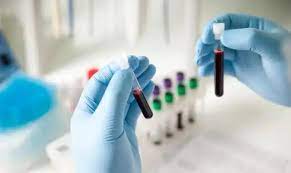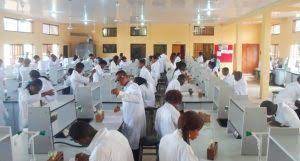Medical Laboratory Science is a dynamic profession that is designed to provide a broad based fundamental scientific knowledge and its application. Such that the graduates are well equipped to meet with the challenges of modern scientific knowledge in Health Care and to enable them proceed for further training.
Students of this discipline at this level are exposed to application of Medical Laboratory Science in key areas e.g. Medicine, Pharmaceutical industries, utility Department (e.g. water corporations), Research institutes, Food industries as well as Diagnostic kit /Machine production.
The courses offered are designed to expose the students to core areas like Clinical Chemistry, Haematology & Blood Group Serology, Histopathology & Cytology, Medical Microbiology, Immunology as well as Instrumentation, Laboratory Management and Entrepreneur skills. Students are required to broaden their knowledge in their core areas by taking ancillary courses in chemistry, mathematics, statistics, biochemistry, anatomy, physiology, pharmacology and biology. They are also expected to understand the working of laboratory instruments and existing techniques and to modify them where possible. The practical aspect of the programme prepares the student always to think in terms of diagnostic criteria in the assessment and evaluation of clinical samples. Students so trained will fit into any diagnostic laboratory in hospitals, research institutes and industries, food laboratories and other allied fields or they may be self-employed.
On the successful completion of the five years Bachelor of Medical Laboratory Sciences Programme and one year internship, preceding participation in the NYSC programme, graduates are registered as Associate members of the Medical Laboratory Science Council of Nigeria. However, such graduates would have earlier enrolled with the Medical Laboratory Science Council of Nigeria as student members.
This Senate approved programme was drawn by NnamdiAzikiwe University, Awka, Nnewi Campus, in consultation with the Medical Laboratory Science Council of Nigeria, to conform with the guidelines for Minimum Academic Standards of both the National University Commission, required for running the BMLS programme in Nigerian Universities and that of the Medical Laboratory Science Council of Nigeria - the Professional regulating Body for the practice in Nigeria.
PHILOSOPHY OF THE PROGRAMME
The broad philosophy of training in medical laboratory sciences should be:
a). To provide sound academic and professional background for the production of medical laboratory scientists who would be capable of working anywhere in Nigeria.
b). To produce medical laboratory scientists who would satisfy internationally recognizable standards and who could undertake further training towards specialization.
c). To produce medical laboratory scientists with sufficient management ability to play leadership roles and entrepreneurship in employing others, establishing self, and also in training and general practice of laboratory sciences.
COURSE DURATION
The BMLS programme shall run for five (5) years for UTME admission, and four (4) years for direct entry candidates.
ADMISSION REQUIREMENTS
Candidates seeking enrollment into the BMLS programme should possess the following minimum entry qualifications:
- Candidates should possess at least 5 credits at ordinary level GCE or SSCE examination for at least not more than 2 sittings. The subjects include: Physics, Chemistry, Biology, Mathematics, and English Language. The student must also have performed well in joint admission matriculation board examination (UTME/JAMB). The university, if deemed necessary may conduct an additional examination. Preference shall be given to candidates with 5 credits at one sitting.
- Direct entry:
(i) Pass in general certificate of education or at advanced level in Physics, Chemistry and Biology (or Zoology) in addition to (1) above.
(ii) Graduates of first degree in related sciences or its equivalent in addition to (1) one above(remedial result is not accepted). Such graduates with CGPA of 3.5 and above shall be deemed to be qualified.
(iii) Candidates who have completed Part II examinations of the Medical Laboratory Science Council of Nigeria and who have relevant qualifications as specified in 1 above may be considered for direct entry.





